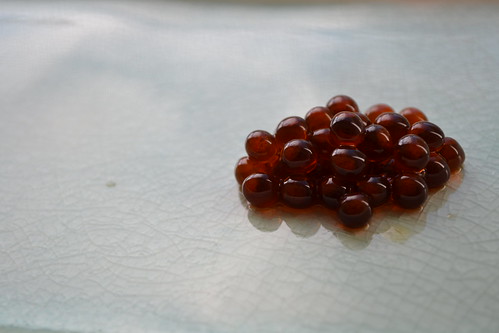
Go to any sushi restaurant in Japan and notice that "ikura" or salmon roe, is either written in katakana or hiragana. I was curious as to why it was often written in katakana--the alphabet designated to loanwords. I asked the master at
Sushi Danran about this curiosity. He told me that "ikura" イクラ comes from the Russian language. The Russian word for "caviar" is "ikra" hence, "ikura" in Japanese. Salmon roe is prevalent in Russia--so much so that they have
salmon roe flavored Lay's! Hit me up.
Last week, my fish monger had some beautiful sacs of salmon roe in his display. I snatched up 1/4 lb at $13.99/lb.
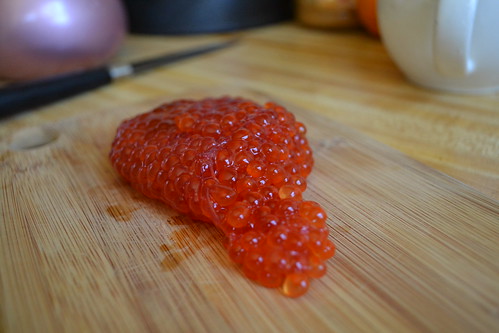
It comes in a membrane sac that holds together all the eggs. This sac must be removed, and the eggs marinated to resemble the ikura that is served in your sushi.
Ikura Shoyu Marinade
INGREDIENTS
1/4 lb. fresh salmon roe (sujiko)
3 tbsp soy sauce
2 tbsp sake
METHOD
1. Place sujiko in warm water and break the eggs away from the sac. The eggs are delicate so be careful when separating them from the membrane sack.
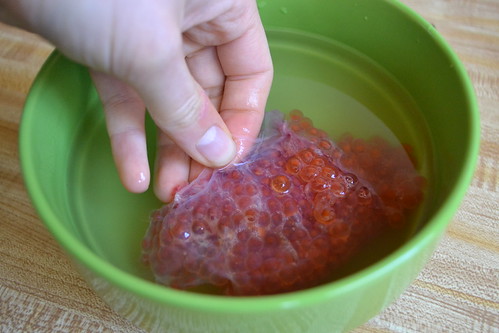
2. Once they are broken apart, rinse them through a colander with cold water.
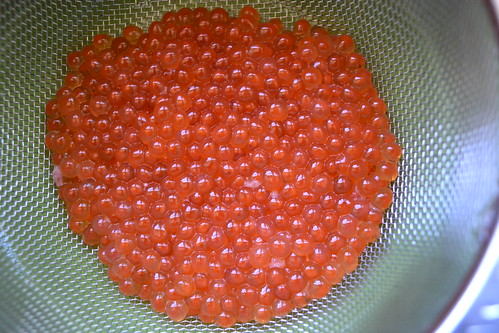
3. Combine soy sauce and sake in a small saucepan and bring the mixture to a boil. Wait until the mixture cools down.
4. Place the ikura in a air-tight food storage container. Pour the liquid mixture over it.
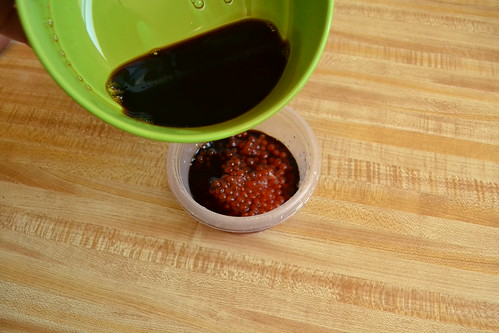
5. Seal the lid on the container and place it in the refrigerator. Wait for a half day before eating.
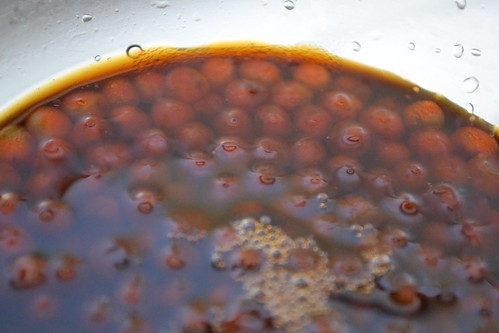 Приятного аппетита!
Приятного аппетита! (Prijatnovo appetita)
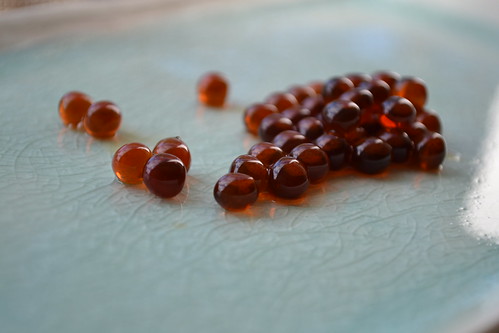
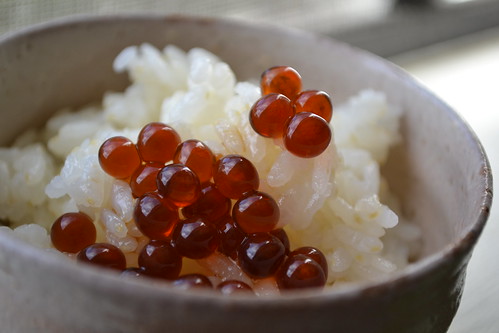
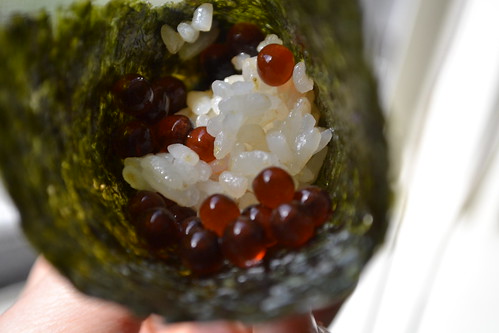
 Go to any sushi restaurant in Japan and notice that "ikura" or salmon roe, is either written in katakana or hiragana. I was curious as to why it was often written in katakana--the alphabet designated to loanwords. I asked the master at Sushi Danran about this curiosity. He told me that "ikura" イクラ comes from the Russian language. The Russian word for "caviar" is "ikra" hence, "ikura" in Japanese. Salmon roe is prevalent in Russia--so much so that they have salmon roe flavored Lay's! Hit me up.
Last week, my fish monger had some beautiful sacs of salmon roe in his display. I snatched up 1/4 lb at $13.99/lb.
Go to any sushi restaurant in Japan and notice that "ikura" or salmon roe, is either written in katakana or hiragana. I was curious as to why it was often written in katakana--the alphabet designated to loanwords. I asked the master at Sushi Danran about this curiosity. He told me that "ikura" イクラ comes from the Russian language. The Russian word for "caviar" is "ikra" hence, "ikura" in Japanese. Salmon roe is prevalent in Russia--so much so that they have salmon roe flavored Lay's! Hit me up.
Last week, my fish monger had some beautiful sacs of salmon roe in his display. I snatched up 1/4 lb at $13.99/lb.
 It comes in a membrane sac that holds together all the eggs. This sac must be removed, and the eggs marinated to resemble the ikura that is served in your sushi.
Ikura Shoyu Marinade
INGREDIENTS
1/4 lb. fresh salmon roe (sujiko)
3 tbsp soy sauce
2 tbsp sake
METHOD
1. Place sujiko in warm water and break the eggs away from the sac. The eggs are delicate so be careful when separating them from the membrane sack.
It comes in a membrane sac that holds together all the eggs. This sac must be removed, and the eggs marinated to resemble the ikura that is served in your sushi.
Ikura Shoyu Marinade
INGREDIENTS
1/4 lb. fresh salmon roe (sujiko)
3 tbsp soy sauce
2 tbsp sake
METHOD
1. Place sujiko in warm water and break the eggs away from the sac. The eggs are delicate so be careful when separating them from the membrane sack.
 2. Once they are broken apart, rinse them through a colander with cold water.
2. Once they are broken apart, rinse them through a colander with cold water.
 3. Combine soy sauce and sake in a small saucepan and bring the mixture to a boil. Wait until the mixture cools down.
4. Place the ikura in a air-tight food storage container. Pour the liquid mixture over it.
3. Combine soy sauce and sake in a small saucepan and bring the mixture to a boil. Wait until the mixture cools down.
4. Place the ikura in a air-tight food storage container. Pour the liquid mixture over it.
 5. Seal the lid on the container and place it in the refrigerator. Wait for a half day before eating.
5. Seal the lid on the container and place it in the refrigerator. Wait for a half day before eating.
 Приятного аппетита! (Prijatnovo appetita)
Приятного аппетита! (Prijatnovo appetita)






Comments (19)
I live in kenai alaska an if you get on Facebook an search any fishing pages here in Alaska you will see so many people throwing eggs right out I even do it myself I do keep about 10 lbs an I make salmon eggs for bit for the August run of silver salmon fishing but I will definitely try this
Wow, I didn’t know about the etymology of ‘ikura’. How interesting! And I didn’t realise that you tsukeru the ikura either. Beautiful photos Yoko:)
Thanks, I love my new D3100. Yeah, ikura would always stand out to me on sushi menus because it would be amongst a sea of kanji.
I need that inside me. My mouth that is.
Craig – I hope you can get sujiko where you are.
北海道出身の三浦は、イクラが大好物です。秋になると各家々で異なる味のイクラが作られます。これはご近所や友人からプレゼントされることも多く、秋の冷蔵庫の中はイクラでいっぱいになります。
私は、みりんとお酒、そして塩で基本的な味付けをして醤油を少なめにします。こうするとイクラの色が黒くならず透き通るオレンジになります。
なお、鷹の爪(赤唐辛子)を微量入れると味が引き締まります。変わったところでは昆布を細かく刻みイクラとつけ込む調理方法もあります。
this is so amazing! now I’m starving for fish eggs at 8 am.
So, I tried your recipe but it took me like, 2 hours or something to get all the nasty membrane off of the eggs. And a lot of them popped. I think that the water that they are soaked in has to be quite hot in order for them to “firm up” for rough handling. So if anyone tries this at home, I suggest using hot (some recipes suggested 100 deg) water. The eggs will turn opaque but then will become transparent again once they are cured in the shoyu or salt.
Thanks for the clarification. It worked okay for me with tepid water though.
Worm – I made mine w/ the sac and it came off easily after marinating. That might be worth trying? I grew up eating it w/ the sac, so it wasn’t a big deal with it on, too.
Yoko – do you dump the marinade and rinse after the day of soaking? Mine were perfect after a day of marinating, but after day two, it was too salty. I dumped out the marinade and did a quick rinse w/ water. Did you have to do that? Maybe I have to eat it faster…